
Monobia quadridens, also known as the four-toothed mason wasp, is a species of solitary potter wasp found in North America. It grows to a wingspan of 18 mm (0.71 in), and feeds on small caterpillars and pollen. Two generations occur per year, with one generation overwintering as pupae.

Eriocampa is a genus of common sawflies in the family Tenthredinidae. There are about ten described species in Eriocampa.
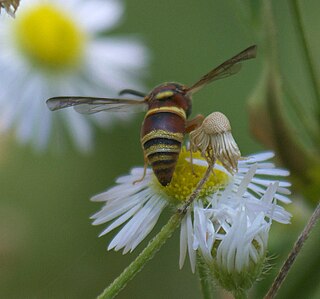
Euodynerus annulatus is a species of stinging wasp in the family Vespidae.

Euodynerus auranus is a species of stinging wasp in the family Vespidae.

Euodynerus crypticus is a species of stinging wasp in the family Vespidae.
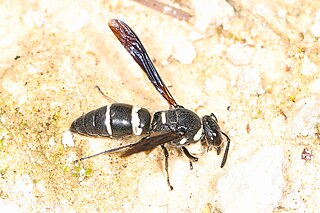
Euodynerus megaera is a species of stinging wasp in the family Vespidae.

Leptochilus acolhuus is a species of stinging wasp in the family Vespidae.

Limonethe is a genus of ichneumon wasps in the family Ichneumonidae. There are about five described species in Limonethe. They can be distinguished from similar genera based on the nearly square-shaped areolet and the large and dense punctures on the post-petiole. Many also have infuscated wings, a red abdomen, black head and mesosoma with narrow white markings along the inner eye margins. Limonethe occurs in the New World from Canada to Argentina.

Monsoma pulveratum, the green alder sawfly, is a species of common sawfly in the family Tenthredinidae. It is a European species that has been accidentally introduced in North America.

Monsoma is a genus of common sawflies in the family Tenthredinidae. There are at least two described species in Monsoma.

Pachodynerus erynnis, known generally as the red-marked pachodynerus or red and black mason wasp, is a species of stinging wasp in the family Vespidae.

Parancistrocerus fulvipes also known by the common name potter wasp is a species of stinging wasp in the family Vespidae. This species' nesting sites include borings in wood, old mud dauber and Polistes nests, and abandoned burrows of ground-nesting bees, but it may also construct its own burrows in the ground. Prey includes caterpillars of Tortricidae, Nolidae, Chloephorinae, Crambidae, and Gelechiidae.

Parancistrocerus histrio is a species of stinging wasp in the family Vespidae.
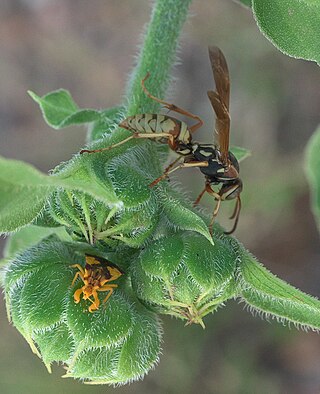
Polistes aurifer, the golden paper wasp, is a species of paper wasp in the genus Polistes of the family Vespidae. It occurs in the western part of North America, from southern Canada through the United States to northern Mexico.
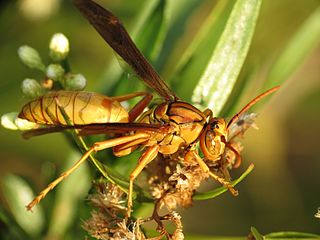
Polistes flavus, also known as the yellow paper wasp, is a species of paper wasp in the family Vespidae.
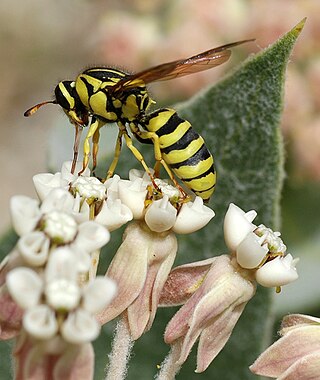
Pseudomasaris coquilletti is a species of pollen wasp in the family Vespidae.
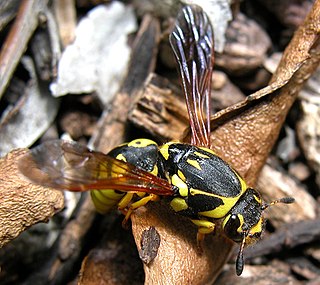
Pseudomasaris vespoides is a species of pollen wasp in the family Vespidae.

Vespula vidua, known generally as the long yellowjacket or widow yellowjacket, is a species of stinging wasp in the family Vespidae.

Zethus slossonae is a species of stinging wasp in the family Vespidae.
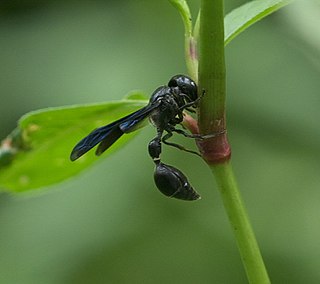
Zethus spinipes is a species of stinging wasp in the family Vespidae.



















